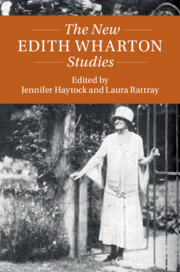Book contents
- The New Edith Wharton Studies
- Twenty-First-Century Critical Revisions
- The New Edith Wharton Studies
- Copyright page
- Contents
- Notes on Contributors
- Acknowledgments
- Editions and Abbreviations
- Introduction
- Part I Self and Composition
- Part II International Wharton
- Part III Wharton on the Margins
- Chapter 7 Edith Wharton’s Unprivileged Lives
- Chapter 8 Wharton, Insurance Culture, and Pain Management
- Chapter 9 Edith Wharton’s Humanimal Pity
- Chapter 10 Edith Wharton and the Writing of Whiteness
- Part IV Sex and Gender Revisited
- Bibliography
- Index
Chapter 8 - Wharton, Insurance Culture, and Pain Management
from Part III - Wharton on the Margins
Published online by Cambridge University Press: 28 November 2019
- The New Edith Wharton Studies
- Twenty-First-Century Critical Revisions
- The New Edith Wharton Studies
- Copyright page
- Contents
- Notes on Contributors
- Acknowledgments
- Editions and Abbreviations
- Introduction
- Part I Self and Composition
- Part II International Wharton
- Part III Wharton on the Margins
- Chapter 7 Edith Wharton’s Unprivileged Lives
- Chapter 8 Wharton, Insurance Culture, and Pain Management
- Chapter 9 Edith Wharton’s Humanimal Pity
- Chapter 10 Edith Wharton and the Writing of Whiteness
- Part IV Sex and Gender Revisited
- Bibliography
- Index
Summary
The essay explores the ways in which Edith Wharton’s early work, written as facts were emerging about corrupt insurance industry practices, inspired questions that Wharton would raise throughout her oeuvre about the monetization of life and death, the evaluation of pain and suffering, and the larger consequences of a managed and insured society. By the early twentieth century, insurance was a central institution in the organization and management of modern life, although it is rarely recognized as a cultural force or context in Wharton’s work. This essay corrects this neglect by asking how an early twentieth-century insurance scandal inspired Wharton’s exploration of a growing wound culture intent on regulating and managing pain and suffering, life and death, and by examining Wharton’s representations of a managerial society rather than the society of manners for which she is still best known.
Keywords
- Type
- Chapter
- Information
- The New Edith Wharton Studies , pp. 129 - 142Publisher: Cambridge University PressPrint publication year: 2019

